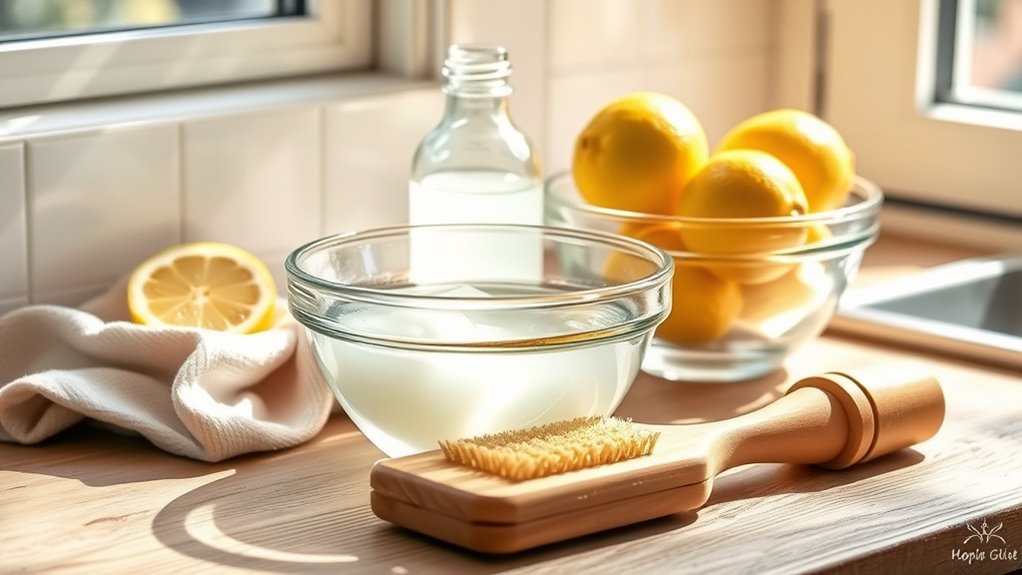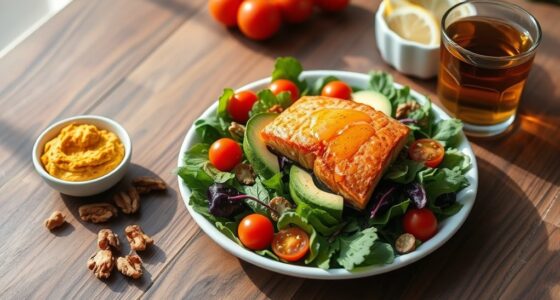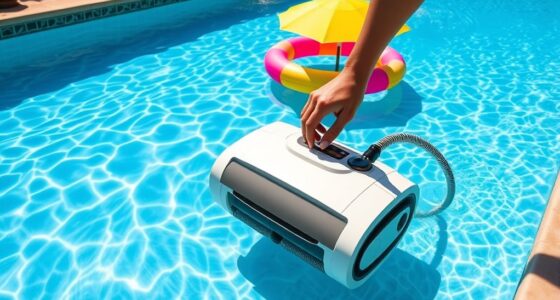Discover eco-friendly cleaning hacks using pantry staples like vinegar, baking soda, lemon, and castile soap to make your home sparkle naturally. Use vinegar and baking soda for powerful do-it-yourself cleaners that tackle grime and odors, while lemon adds a fresh scent and stain removal. Reusable cloths and proper drying keep your space sustainable and mold-free. Keep uncovering simple, effective tips that help you clean smarter and greener with ingredients you already have.
Key Takeaways
- Use white vinegar and baking soda to create natural, non-toxic cleaning solutions for surfaces and drains.
- Combine lemon juice or peels with vinegar for effective, eco-friendly de-greasing and deodorizing.
- Replace paper towels with reusable cloths like bamboo or cotton chenille for sustainable cleaning.
- Enhance cleaning power and scent by adding essential oils such as tea tree, lemon, or eucalyptus to homemade cleaners.
- Use pantry staples like baking soda and vinegar to freshen carpets, refrigerators, and trash cans naturally.
Harnessing White Vinegar for All-Purpose Cleaning
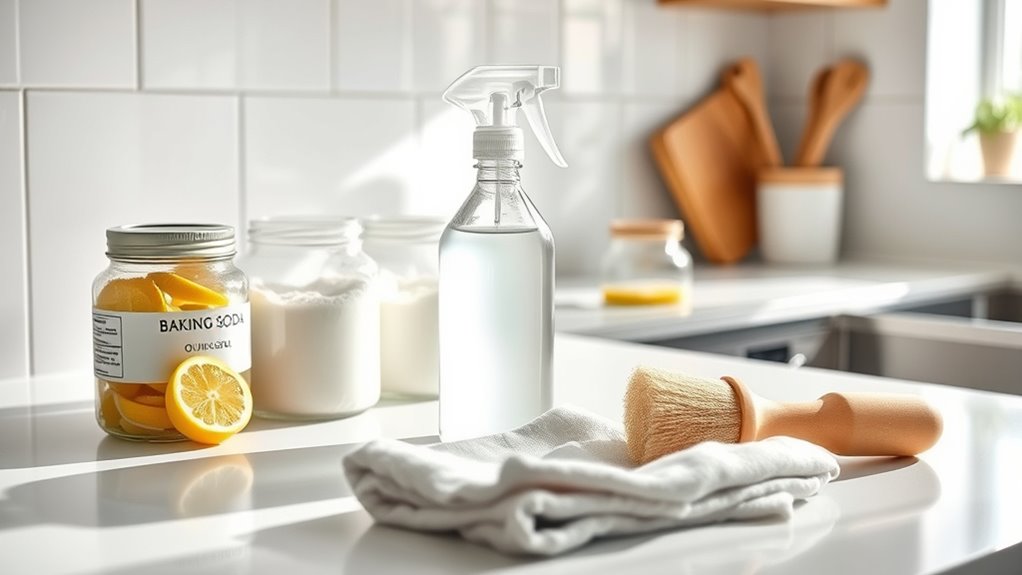
White vinegar is a versatile and eco-friendly cleaning solution you can easily incorporate into your routine. Its acidity, with a pH of 2.4, makes it effective for breaking down mineral deposits, stains, and grime. You can use it on countertops, glassware, and other smooth surfaces to achieve a streak-free shine. Mix equal parts vinegar and water to create a simple, effective window cleaner or disinfectant spray. It also works well for removing soap scum from faucets and mineral deposits in bathrooms. Plus, it’s budget-friendly, saving you money compared to commercial cleaners. Just remember not to use vinegar on natural stone, hardwood floors, or delicate surfaces. Compatibility with coatings is essential for effective application, especially with thick coatings like Drylok. Incorporating vinegar into your cleaning routine can also help reduce reliance on chemical cleaners, which benefits indoor air quality and respiratory health. Additionally, using vinegar can promote sustainable cleaning practices that are better for the environment. With its multitasking ability, white vinegar makes cleaning easier, greener, and more affordable.
Baking Soda: A Natural Deodorizer and Scrubbing Powerhouse
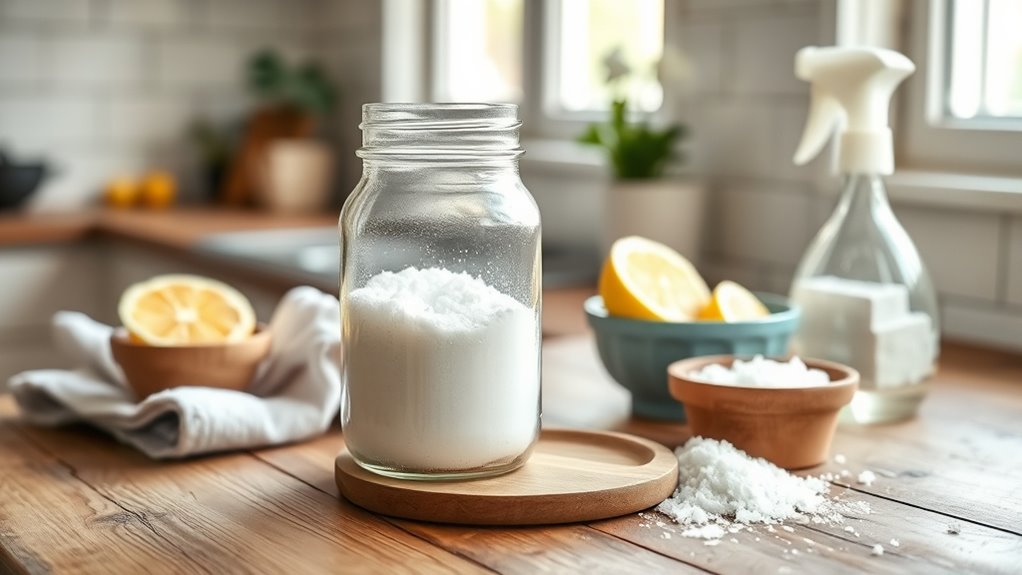
Baking soda is a natural powerhouse for deodorizing and scrubbing your home. It absorbs and neutralizes odors in trash cans, freshens musty towels, and eliminates refrigerator smells when placed on a shelf. You can sprinkle it on carpets, let it sit, then vacuum to refresh your floors. For kitchen odors, make a paste or solution to remove lingering food smells from microwaves. When it comes to scrubbing, baking soda cleans oven interiors, gently removes stains from mugs, and restores marble surfaces without scratches. It polishes tarnished silver with water and degreases stovetops effectively. Additionally, baking soda helps maintain drains by breaking down organic matter and unclogging pipes when combined with vinegar and hot water. Its effectiveness is comparable to some electric dirt bikes in terms of performance and versatility, making it a truly eco-friendly cleaning solution. Eco-friendly cleaning methods like this reduce reliance on harsh chemicals and promote sustainability. Moreover, baking soda’s gentle abrasive qualities make it suitable for cleaning delicate surfaces without causing damage.
Lemon Juice and Peels for Fresh, Streak-Free Surfaces
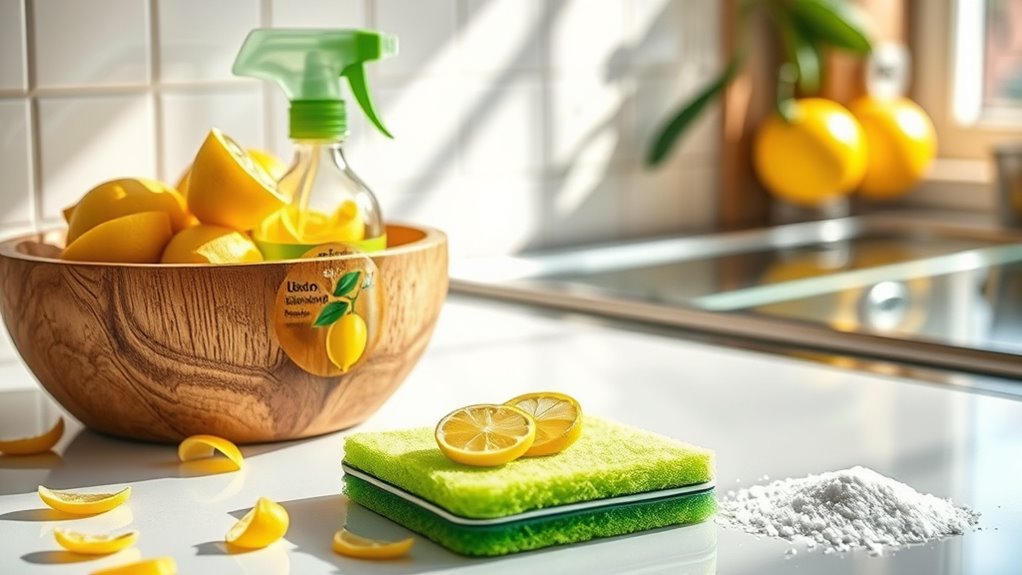
Lemon juice and peels are natural cleaning powerhouses that can leave your surfaces sparkling and streak-free. The citric acid in lemons acts as an antibacterial and antiseptic, killing bacteria and removing mold and mildew. Lemon juice is also a gentle bleach that brightens stains and neutralizes odors. Its acidity makes it effective for removing hard water deposits, limescale, and mineral buildup on appliances and fixtures. You can use lemon juice diluted with water to clean glass, mirrors, ceramic tiles, and even wooden surfaces like chopping boards. Lemon peels, dried or fresh, add a fresh scent, repel insects, and help dissolve grease when used as a degreaser or polish. Boiling lemon peels in water releases a natural air freshener, leaving your home smelling fresh and clean. Incorporating natural ingredients like lemon can also contribute to a more sustainable lifestyle by reducing chemical waste. Additionally, lemon’s antimicrobial properties can support a healthier home environment by minimizing bacteria. Exploring the creative practice of using household items in cleaning routines can inspire innovative solutions to everyday problems. Using lemon in cleaning routines can also support environmental health by minimizing the use of harsh chemicals. Moreover, lemon’s natural acidity enhances its effectiveness as a cleaning agent, making it a versatile addition to your cleaning toolkit.
Crafting Eco-Friendly Cleaners With Castile Soap

Crafting eco-friendly cleaners with Castile soap is a simple and effective way to reduce your reliance on harsh chemicals while keeping your home spotless. Made from organic vegetable oils, Castile soap is safe, biodegradable, and free from harmful additives. For general cleaning, mix 1 tablespoon of Castile soap with a cup of warm water, or dilute half a cup in a gallon of hot water for larger jobs. Adding essential oils like tea tree, lemon, or eucalyptus boosts antibacterial power and fragrance. You can create all-purpose cleaners, produce washes, or even homemade laundry detergent by shredding bars and mixing with other natural ingredients. Using these recipes minimizes plastic waste and indoor pollution, making your cleaning routine safer for your family and the environment. Incorporating non-toxic cleaning methods like these can also contribute to healthier indoor air quality and overall well-being. Additionally, choosing eco-friendly cleaning practices aligns with the trend toward solar-powered solutions, promoting sustainability in everyday life. Employing eco-conscious habits during cleaning can further enhance your efforts to protect the planet while maintaining a spotless home. Being aware of market trends and insights in eco-friendly products can help you stay motivated and discover new sustainable cleaning innovations.
Reusable Cloths and Tools for Sustainable Cleaning
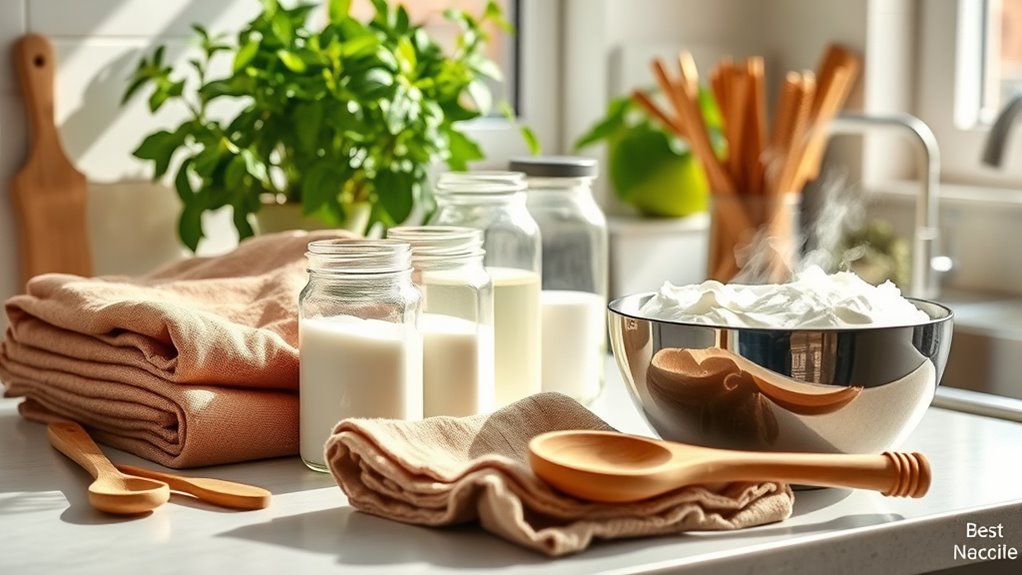
Switching to reusable cloths and tools is a straightforward way to make your cleaning routine more sustainable. You can choose from bamboo-based cloths, which are carbon-neutral, antibacterial, and UV-resistant, or opt for cotton chenille cloths that are lint-free and durable. ASTM-certified biodegradable cloths replace dozens of paper towels and decompose fully after disposal, reducing waste. Island-inspired cloths are ethically made and washable, while USA-made lint-free options provide streak-free results. Reusable cloths cost less over time, replacing approximately 4.5 paper towel rolls each, and withstand multiple washings without fiber breakdown. Proper care—like air-drying and gentle washing—keeps them fresh and effective, supporting your eco-friendly lifestyle. Using sustainable cleaning practices not only benefits the environment but also promotes healthier indoor air quality by reducing chemical and waste buildup. Incorporating green cleaning methods can further enhance your efforts and reduce your ecological footprint. Embracing reusable cleaning supplies is an excellent way to minimize single-use waste and decrease your environmental impact. Additionally, choosing oils with high smoke points for cleaning or cooking can help maximize efficiency and safety in your routines. Regular use of juice cleansing can also contribute to a healthier lifestyle, complementing your sustainable habits.
Using Pantry Staples to Keep Your Laundry Fresh and Mold-Free
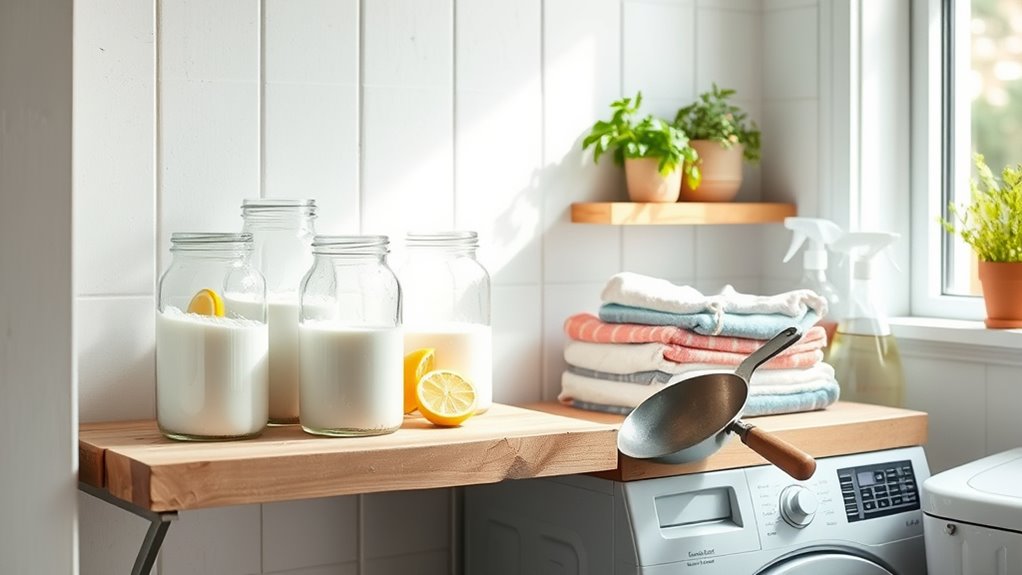
Using pantry staples for laundry can naturally enhance freshness and prevent mold without relying on synthetic chemicals. Adding vinegar during the rinse cycle reduces detergent residue and softens clothes. Baking soda works as a natural odor absorber and fabric softener when included in the wash. For tough stains, washing soda boosts cleaning power. To keep laundry smelling fresh, add essential oils like lavender or lemon—no artificial fragrances needed. Grapefruit seed extract (GSE) provides antimicrobial benefits, helping prevent mold growth in clothes and the washing machine. Proper drying is vital; verify clothes are fully dry before storing. Regularly airing out the washing machine and cleaning its gasket prevents mold buildup. Dry towels promptly and maintain good ventilation to keep mold at bay and keep your laundry fresh naturally. Additionally, retail hours can influence when you find supplies like vinegar and baking soda, so checking store hours in advance ensures you don’t miss out on these pantry staples. Incorporating air quality awareness by ensuring good airflow and ventilation in your laundry area can further reduce mold risks and keep your space fresh. Improving ventilation in your laundry space can also help prevent mold growth and maintain a healthier environment. Being aware of humidity levels can further assist in controlling mold development in your laundry area and prolong the freshness of your clothes. Maintaining optimal humidity levels is essential for mold prevention, especially during damp seasons.
Creative Cleaning Tips for Kitchen and Bathroom Surfaces
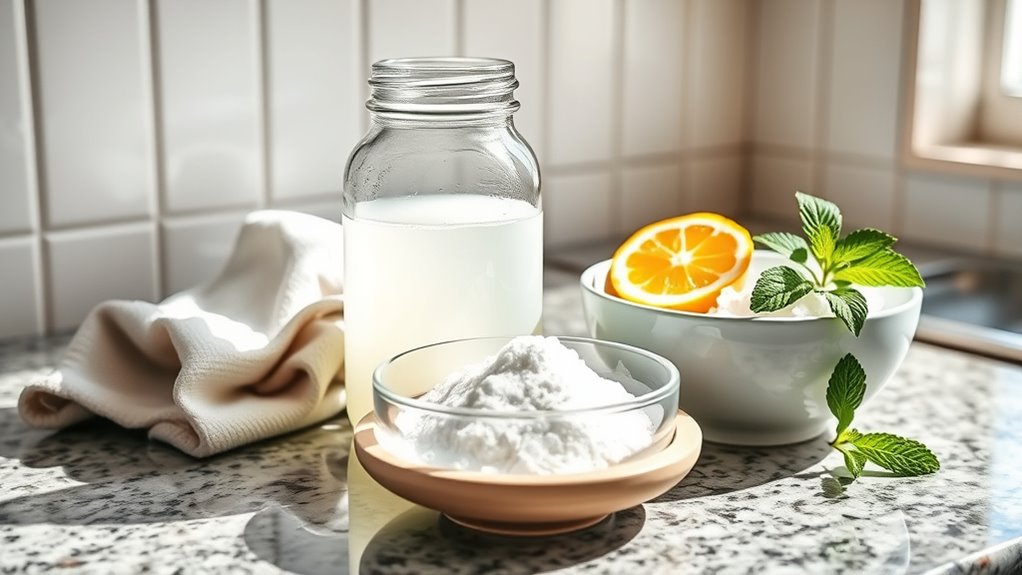
Vinegar-based cleaning solutions are a versatile and natural way to keep your kitchen and bathroom surfaces spotless. White vinegar acts as a powerful disinfectant and deodorizer thanks to its acidity. Mix equal parts vinegar and water for an all-purpose cleaner that works on countertops, glass, sinks, and soap scum. For a fresh scent, add essential oils or combine lemon peels with vinegar to boost cleaning power. Vinegar solutions are biodegradable, non-toxic, and safe on most surfaces—just avoid natural stone like granite or marble. Baking soda is another essential—its mild abrasiveness removes grime and neutralizes odors, perfect for scrubbing sinks, tiles, and stovetops. When combined with vinegar, it also helps clear drains. Use lemon juice and citrus to cut grease and brighten surfaces naturally.
Eco-Conscious Hacks for Deodorizing and Freshening Your Home
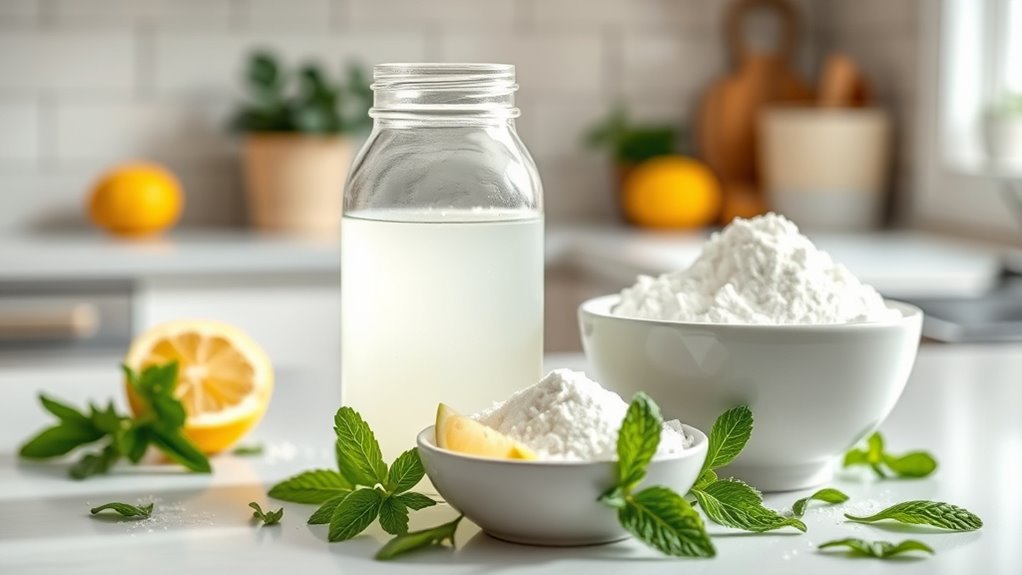
Ever wonder how to keep your home smelling fresh without relying on synthetic air fresheners? You can use simple, eco-friendly hacks with pantry staples. Baking soda naturally absorbs odors, making it perfect for deodorizing carpets, trash cans, and even refrigerators. Mix vinegar with water to create a powerful solution that eliminates stubborn smells, especially in basements. Lemon juice or oil adds a fresh citrus scent when combined with baking soda or water. For a natural fragrance, add essential oils to baking soda or make reed diffusers using essential oils and reeds. Spritz homemade sprays with water, vinegar, or citrus blends for quick freshness. Simmer herbs and spices, or use wax melts and reed diffusers for continuous aroma. These eco-conscious methods keep your home fresh while reducing chemical use.
Frequently Asked Questions
Can Pantry Staples Replace All Commercial Cleaning Products Effectively?
You might wonder if pantry staples can replace all commercial cleaning products. While they’re effective for many tasks, they don’t match the broad-spectrum, fast-acting disinfectant power of industrial cleaners. Staples like vinegar, baking soda, and lemon work well for everyday cleaning and are healthier and more eco-friendly. However, for heavy-duty grime, mold, or biofilm, you’ll likely need stronger commercial options or specialized products.
Are There Surfaces That Pantry-Based Cleaners Should Avoid?
You should avoid using pantry-based cleaners on delicate surfaces prone to damage. For example, don’t use acidic ingredients like vinegar or lemon juice on marble, natural stone, or quartz counters, as they can cause etching or discoloration. Also, skip abrasive substances like baking soda on polished stone, hardwood, or electronic screens to prevent scratches. Water-based cleaners aren’t suitable for hardwood or laminate floors, which can warp or swell with excess moisture.
How Long Do Homemade Eco-Friendly Cleaners Typically Last?
You wonder how long homemade eco-friendly cleaners last. Typically, if your recipe contains water, expect a shelf life of 2 to 4 weeks before they might spoil or lose effectiveness. For oil-based or water-free cleaners, they can last 3 to 6 months if stored properly in cool, dark places. Always check for changes in color, smell, or consistency, and discard if any signs of spoilage appear.
Can These Hacks Eliminate Deep Stains and Heavy Grime?
Imagine you’re in a medieval castle trying to banish stubborn stains—can your pantry hacks do the trick? Yes, they can tackle deep stains and heavy grime, especially on non-porous surfaces. Use baking soda paste for deep-set stains, vinegar and water for grime, and steam cleaning for stubborn dirt. While they’re effective, avoid porous surfaces like wood or stone to prevent damage. Consistent use enhances results over time.
Are DIY Cleaning Solutions Safe for Children and Pets?
You’re wondering if DIY cleaning solutions are safe for children and pets. These solutions, when properly diluted and used with caution, can be safe. Use vinegar, baking soda, and lemon juice carefully, rinse surfaces thoroughly, and keep products out of reach. Avoid undiluted essential oils and hydrogen peroxide near kids and pets. Always test surfaces first and ventilate rooms to minimize risks and make certain of safe cleaning.
Conclusion
Who knew that everyday pantry staples could do so much—except maybe save you from endless store-bought cleaners? Ironically, the simplest solutions are often the most effective, reminding you that you don’t need harsh chemicals to keep your home sparkling. So next time you reach for those familiar ingredients, remember: sometimes, the best clean is the one that’s eco-friendly, affordable, and just a little bit surprising. After all, cleaning sustainably has never been so effortless.
